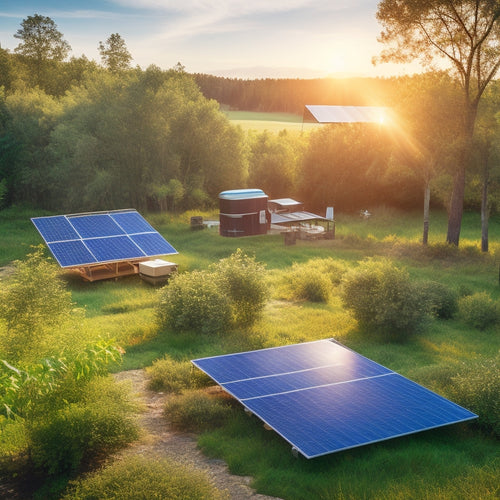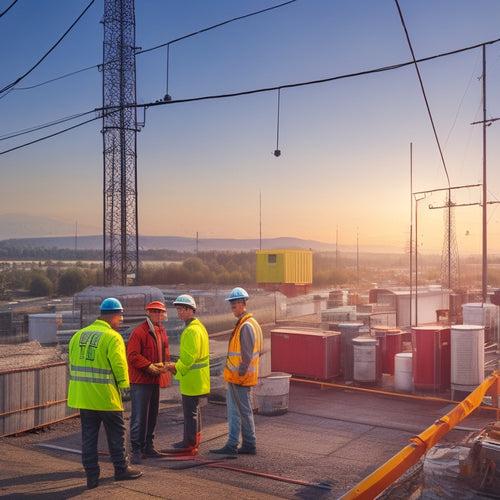
Why Invest in Home Power Systems?
Share
By investing in a home power system, you're not only reducing your reliance on the grid and lowering your energy bills, but you're also taking an essential step towards energy independence, security, and a more sustainable future. You'll enhance your property value, improve air quality, and guarantee a consistent power supply during outages. With clean energy sources like solar and wind, you'll decrease your carbon footprint and contribute to a greener future. As you investigate the benefits of home power systems, you'll find out how they can enable you to take control of your energy needs and open up long-term savings and peace of mind.
Key Takeaways
- Investing in home power systems provides energy independence and security by reducing reliance on the grid and ensuring a consistent energy supply.
- Home power systems reduce carbon footprints and environmental impact by utilizing clean and renewable energy sources like solar, wind, and geothermal.
- They offer significant financial benefits, including lower monthly utility bills, long-term savings, and increased property value.
- Home power systems improve energy efficiency, reducing consumption and waste, and enhancing overall energy management.
- By providing a reliable and consistent power supply, home power systems ensure operational essential appliances and support uninterrupted daily activities.
Boosting Energy Independence
One of the most significant benefits of investing in home power systems is that they can dramatically enhance your energy independence. By integrating energy storage solutions, such as batteries, into your system, you'll be able to store excess energy generated by your solar panels or wind turbines during the day and use it at night or during power outages. This reduces your reliance on the grid, providing you with a stable and consistent energy supply.
For instance, a well-designed off-grid system with deep cycle batteries can provide a reliable source of energy. Additionally, proper system sizing and maintenance are essential to guarantee peak performance and longevity.
Furthermore, home power systems can contribute to grid resilience by reducing the strain on the grid during peak hours, helping to prevent brownouts and blackouts. By investing in a home power system, you'll be taking a significant step towards achieving energy independence and contributing to a more resilient energy infrastructure.
Reducing Carbon Footprint Effectively
You can greatly reduce your carbon footprint by shifting to clean energy sources, such as solar or wind power, which generate electricity without burning fossil fuels.
Integration of solar energy greatly decreases reliance on fossil fuels, enhancing energy efficiency and lowering carbon emissions sustainable solution.
By exploring renewable power options, like geothermal or hydroelectric energy, you'll further minimize your reliance on non-renewable resources.
Additionally, adopting eco-friendly lifestyle choices, such as energy-efficient appliances and sustainable building materials, will help you achieve a considerable decrease in your carbon footprint.
Clean Energy Sources
Utilizing clean energy sources is an essential step towards reducing your carbon footprint effectively, as fossil fuel-based power generation is a major contributor to greenhouse gas emissions.
You can achieve this by utilizing solar technology, which converts sunlight into electricity, reducing your reliance on fossil fuels. Wind innovations also play a vital role, as wind turbines generate power without emitting pollutants.
By adopting these clean energy sources, you'll markedly decrease your carbon footprint and contribute less to climate change. Additionally, you'll reduce air pollution, protecting public health and the environment.
Renewable Power Options
Clean energy sources pave the way for renewable power options, which can considerably reduce your carbon footprint. By investing in home power systems, you can utilize the power of nature to generate electricity. Two popular renewable power options are solar and wind energy.
| Renewable Power Option | Advantages |
|---|---|
| Solar Energy | Reduces electricity bills, low maintenance, and solar panel advantages include durability and long lifespan |
| Wind Energy | Abundant wind energy potential, low operating costs, and can be used for both residential and commercial purposes |
| Geothermal Energy | High efficiency, reliable, and can provide both heating and cooling |
| Hydro Energy | Renewable and sustainable, can be used for irrigation and other purposes |
| Biomass Energy | Can be produced from organic waste, reduces landfill waste, and is carbon neutral |
These renewable power options offer a cleaner and more sustainable way to generate electricity, reducing your reliance on fossil fuels and decreasing your carbon footprint.
Eco-Friendly Lifestyle Choices
One significant step towards reducing carbon footprint effectively is adopting eco-friendly lifestyle choices that permeate every aspect of daily life.
You can make a tangible impact by incorporating sustainable materials and energy-efficient solutions into your daily routine.
-
Imagine waking up in a home powered by renewable energy, where every appliance and gadget is designed with energy efficiency in mind.
-
Envision a kitchen where sustainable materials are used in every aspect, from the countertops to the utensils.
-
Visualize yourself driving an electric vehicle, reducing your reliance on fossil fuels and minimizing air pollution.
Lowering Utility Bills Dramatically
By investing in a home power system, you'll reduce your energy consumption through optimized energy harvesting and storage.
This, in turn, will slash your monthly expenses, as you'll rely less on the grid and more on your own clean energy.
By minimizing transmission losses and optimizing your system's efficiency, you'll cut power loss and save even more on your utility bills.
Advanced battery systems, such as lithium-ion batteries, can detect and store excess energy from renewable sources, allowing you to use it during outages or at night, further reducing your reliance on the grid.
Reduce Energy Consumption
Your home's energy consumption is a significant contributor to your utility bills, and reducing it can lead to substantial savings. By investing in a home power system, you can optimize your energy usage and cut down on waste. This is achieved through energy efficiency and smart technology, which work together to monitor and adjust your energy consumption in real-time.
Some benefits of reducing energy consumption include:
- Lowering your carbon footprint and contributing to a more sustainable future
- Increasing your home's value and appeal to potential buyers
- Enjoying a sense of independence from the grid and reducing your reliance on public utilities
Slash Monthly Expenses
A crucial aspect of investing in a home power system is the potential to slash monthly expenses dramatically.
By generating your own clean energy, you'll greatly reduce your reliance on the grid and subsequently lower your utility bills. This translates to substantial energy savings over time, which can add up to thousands of dollars per year.
As you enjoy these savings, you'll gain financial freedom and a sense of security, knowing that you're in control of your energy costs.
With a home power system, you can allocate your money more efficiently, investing in what matters most to you.
Cut Power Loss
The electricity grid's inefficiencies result in a significant amount of power loss during transmission and distribution, ultimately leading to higher utility bills for homeowners.
This means you're paying for energy that's not even being used in your home. By investing in a home power system, you can cut power loss and lower your utility bills dramatically.
- You'll reduce your reliance on the grid, minimizing the impact of transmission and distribution losses on your wallet.
- You'll increase your energy efficiency, making your home a more sustainable and environmentally friendly space.
- You'll take a significant step towards adopting sustainable practices, reducing your carbon footprint and contributing to a cleaner, greener future.
Gaining Energy Security Benefits
Energy independence is a critical aspect of home power systems, and gaining energy security benefits is a significant advantage of investing in these systems.
You'll experience increased energy resilience, as your home is less dependent on the grid, which can be unreliable during natural disasters or infrastructure failures.
With a home power system, you'll enjoy power reliability, ensuring that your lights stay on, and your essential appliances remain operational.
This means you'll have a steady supply of power, even when the grid is down.
Increasing Property Value Potential
As you consider investing in a home power system, you'll appreciate that it can greatly enhance your property's value potential.
Home upgrades like solar panels or energy storage systems can greatly increase your property's market appeal, making it more attractive to potential buyers if you decide to sell in the future.
- Increased property value can lead to higher selling prices or refinancing opportunities
- Energy-efficient features are highly sought after by environmentally conscious and cost-aware homebuyers
- A home power system can be a major differentiator in a competitive real estate market
Enjoying Cleaner Air Quality
One significant benefit of investing in a home power system is that you'll breathe easier, literally. By generating your own clean energy, you'll reduce your reliance on the grid, which often relies on fossil fuels that pollute the air. This, in turn, improves your indoor air quality.
| Pollutant | Health Effects | Reduced with Home Power |
|---|---|---|
| Particulate Matter | Respiratory issues, lung damage | |
| Nitrogen Dioxide | Respiratory issues, cardiovascular disease | |
| Sulfur Dioxide | Respiratory issues, acid rain | |
| Ozone | Respiratory issues, cardiovascular disease | |
| Carbon Monoxide | Headaches, dizziness, nausea |
Frequently Asked Questions
What Is the Average Lifespan of a Home Power System?
You'll find that the average lifespan of a home power system varies, typically ranging from 20 to 30 years, depending on cost factors like quality and maintenance, as well as its environmental impact on the surrounding ecosystem.
Are Home Power Systems Compatible With Existing Electrical Infrastructure?
You'll find that home power systems seamlessly integrate with existing electrical infrastructure, enabling grid integration and energy independence, as they're designed to work in tandem with your current setup, ensuring a smooth changeover to a more autonomous energy future.
Can I Install a Home Power System Myself?
You can install a home power system yourself, but make sure you consider DIY installation challenges, safety considerations, and necessary tools; research cost savings, system types, and local regulations to avoid potential pitfalls and guarantee a successful project.
How Often Do Home Power Systems Require Maintenance?
You'll need to perform routine maintenance every 6-12 months to guarantee peak performance, with average maintenance costs ranging from $100 to $500 annually, depending on the system's complexity and component quality.
Are There Any Government Incentives for Home Power System Installations?
You'll be interested to know that 30% of the total cost of a home power system can be offset by federal tax credits. Additionally, you may be eligible for state rebates, further reducing your investment in a home power system installation.
Related Posts
-

Solar Phone Chargers for Camping Essentials
Solar phone chargers are must-haves for your camping essentials, allowing you to stay connected while enjoying nature...
-

Top Off Grid Solar Batteries for Renewable Energy
When seeking top off-grid solar batteries for renewable energy, consider options with advanced battery chemistry, suc...
-

Smart Grid Technology Implementation Challenges
You'll encounter several challenges when implementing smart grid technology, particularly in cost management, scalabi...


